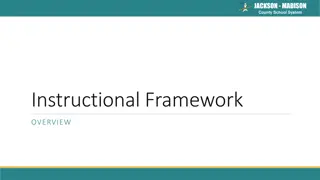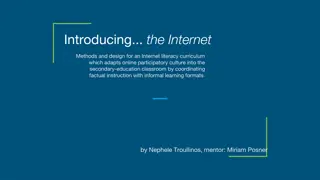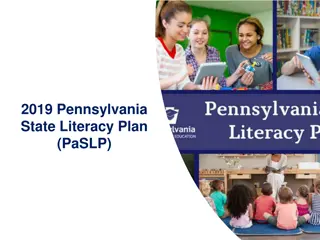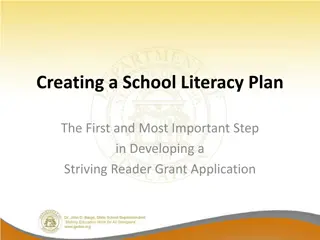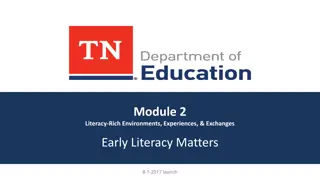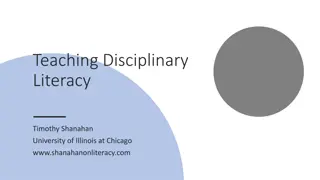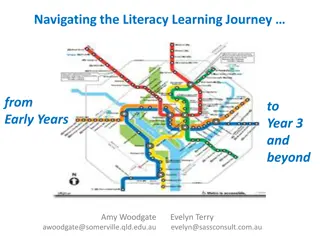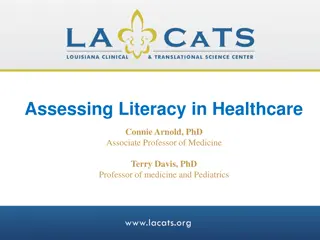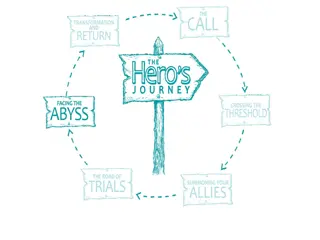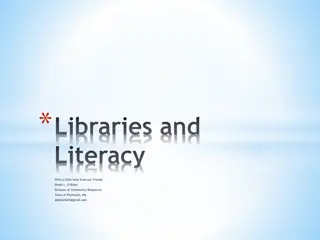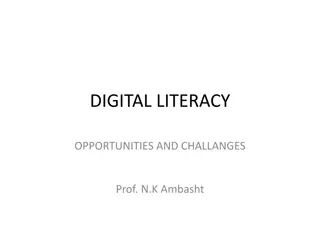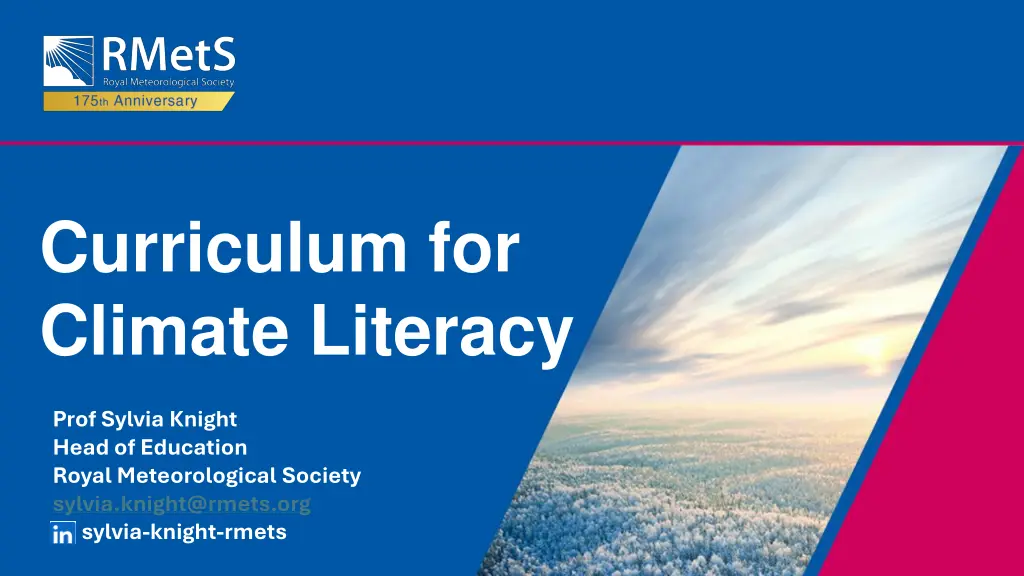
Climate Literacy Curriculum and Survey Insights
Explore insights from the Climate Literacy Curriculum and Survey, including data on students' awareness of climate change, perceptions of its impact, and educational initiatives by leading organizations. Stay informed on climate literacy trends and educational strategies for a sustainable future.
Download Presentation

Please find below an Image/Link to download the presentation.
The content on the website is provided AS IS for your information and personal use only. It may not be sold, licensed, or shared on other websites without obtaining consent from the author. If you encounter any issues during the download, it is possible that the publisher has removed the file from their server.
You are allowed to download the files provided on this website for personal or commercial use, subject to the condition that they are used lawfully. All files are the property of their respective owners.
The content on the website is provided AS IS for your information and personal use only. It may not be sold, licensed, or shared on other websites without obtaining consent from the author.
E N D
Presentation Transcript
Curriculum for Climate Literacy Prof Sylvia Knight Head of Education Royal Meteorological Society sylvia.knight@rmets.org sylvia-knight-rmets
Climate Literacy Survey 2022-2024 2021 onwards 2023/ 24 111 responses in Scotland (5 questions, unpublished) (Report published by the DfE (English data, 55 questions) December 2024 https://www.metlink.org/blog/dfe-climate-literacy-survey-2024/)
Climate Literacy in S4/ S5 students 2023/ 2024 How old were you when you were last taught about climate change in a lesson at school? Scotland 25 20 15 10 5 0 younger than 11 11 12 13 14 15 16 17 never cant remember
Climate Literacy in S4/ S5 students 2023/ 2024 How much do you think the climate of the Earth has warmed since 1850, if at all? Scotland 25 20 15 10 5 0 (0.2, 0.4] (0.6, 0.8] (1, 1.2] (1.4, 1.6] (1.8, 2] (2.2, 2.4] (2.6, 2.8] (3, 3.2] (3.4, 3.6] (3.8, 4] [0, 0.2] (0.4, 0.6] (0.8, 1] (1.2, 1.4] (1.6, 1.8] (2, 2.2] (2.4, 2.6] (2.8, 3] (3.2, 3.4] (3.6, 3.8]
Climate Literacy in S4/ S5 students 2023/ 2024 In your lifetime, to what extent do you think climate change will affect you personally, if at all? Scotland 60 50 CAREERS 40 30 20 10 0 A great deal quite a bit not very much not at all
Climate Literacy Survey 2024/ 2025 S4, 55 questions Currently have over 1,600 responses, 48% England, 41% Scotland (S4), 8% Wales Deadline (end of June for Scotland)
Curriculum for Climate Literacy Association for Language Learning Association for Physical Education Association for Science Education Association for the Teaching of Psychology British Computing Society Design and Technology Association Engineering UK Geographical Association Global Action Plan Institute of Physics Joint Mathematical Council Mathematical Association Music Mark National Drama PSHE Association Regenerative Economics Royal Geographical Society Royal Economic Society Royal Meteorological Society Royal Society of Chemistry Royal Statistical Society SOS-UK The Classical Association The English Association TIDE community University College, London, Centre for Climate Change and Sustainability Education University of Reading
Curriculum for Climate Literacy All students should leave school with the necessary climate literacy required to be citizens of a world where the climate is changing, irrespective of their subject choices. All need to know/ some need to know. Climate change is a multi-disciplinary problem that requires a multi-disciplinary approach to both solutions and learning. Systems thinking is key, and the climate system (as well as the Earth s natural, social and political systems) span school subject disciplines. Responsibility of all. Learning in science and geography provides the foundations for all other subjects. We have aimed to create a well sequenced, progressive curriculum where disciplinary or substantive knowledge and understanding is developed progressively and is not repetitive or tokenistic. We have supplied very detailed information so that this can be implemented in any curriculum, whatever its framework. The detail is necessary to ensure equitable provision of high-quality climate education which is not dependent on teacher expertise or awareness. We acknowledge the risk of curriculum overload and have endeavoured to suggest an appropriate amount of content in each subject. However, in some subjects, there does need to be a significant proportion of the curriculum dedicated to climate literacy. The curriculum should have the flexibility to keep up to date with climate science, climate solutions (adaptation and mitigation) and the current state of the world, not least because this keeps it relevant to the skills for green jobs and careers options open to school leavers. The curriculum should be flexible enough for teachers to be able to adapt it to local contexts.
Curriculum for Climate Literacy Critical thinking should be embedded throughout the curriculum. It has relevance beyond climate literacy but is particularly relevant here. Teacher support is critical to delivery of this curriculum. We recognise that significant teacher training and CPD will be required to allow confident delivery of high-quality climate education, as well as classroom resource provision. This is a Curriculum for Climate Literacy, not specifically for biodiversity or wider sustainability or environmental issues, whilst recognising that these topics are not entirely separable from climate literacy, because that is where our (RMetS) expertise lies. This is a curriculum of hope, focussed as much as possible on solutions and green careers whilst still developing sound understanding of climate change and its far-reaching implications. Subjects with a strong connection to a related career in climate change have these links explicitly developed within them We have highlighted sequencing links to other subjects but assumed progression within the same subject (e.g. across the sciences). Climate literacy supports global and local citizenship. Climate literacy supports stewardship of the Earth and its resources. This curriculum is focussed on knowledge and understanding. Skills & values constitute an equally vital part of a complete and coherent curriculum.
Curriculum for Climate Literacy - Computing Computer Science/ IT In computer science, the numerical, data and statistical skills introduced in mathematics are brought together with subject knowledge from the sciences, geography and elsewhere to explore the potential for computing to help us understand the climate system as well as the environmental impact of computing, AI, data centres and digital communications. Through the cross-curricular concepts of computational thinking that underpin the discipline, it is possible to decompose and abstract problems to produce computational solutions through algorithmic thinking, generalisation and evaluation. The use of computers and other devices to access data and information, to interrogate, analyse and display data and to communicate are key skills which can be developed in computer science lessons and made use of in climate learning across all subjects.
Curriculum for Climate Literacy Design & Tech Design & Technology / Engineering These and related subjects empower young people to design a better world, whilst at school and in their future careers. The curriculum should go beyond looking at the energy/ carbon/ environmental resource footprint of products and processes to looking for technical solutions to the climate crisis. Through clear and well-sequenced links particularly with the sciences, the causes, impact and crucially the emerging solutions to environmental problems, particularly climate change, can be integrated throughout the curriculum, clearly demonstrating career opportunities. Key skills which can be developed in this area relate to careers, communication, and creative thinking. Data, statistics and numeracy skills introduced in mathematics can be developed.
Curriculum for Climate Literacy Economics/ Business Economics and Business Studies The subjects of Economics/ Business Studies are subjects where there are many opportunities for understanding and knowledge to be synthesised and made relevant to individuals and their communities. - The cost of mitigation, adaptation or not acting to mitigate or adapt to climate change for an individual or household. Economic drivers of action. An understanding of insurance and risk relating to extreme weather events at a personal/ household/ business level. Spending options for sustainability and ethical reasons. - - - Understanding that the economy is embedded in social and ecological systems, both dependent on those systems and impacting them. Understand the dynamic interaction between households, markets, government and the commons, and the perspectives of different economic agents in those four provisioning systems. The ethics and sustainability implications of business activity. Alternative economic systems. How we organise our economies and societies impacts the levels of human cooperation, reciprocity and care. Understanding that the economy includes interconnected provisioning institutions including households (unpaid care and domestic work), markets, commons (self-organised management of shared resources) and state, each of which has their own and overlapping roles that are critical for a healthy, resilient society. - - - -
Curriculum for Climate Literacy Economics/ Business 7-11 Understand that we are part of nature, not separate from it; everything humans do and make depends on the Earth and climate systems and impacts their function. Understanding that our actions (as individuals and communities) have an impact on the environment, and that products & actions have a financial and environmental cost. Consumer choice; recognising and beginning to manage influences on choices. Business responsibility. Stakeholder perspectives. Case studies of green careers. Ecosystem services from geography English persuasive writing Creative expression in drama, music, art, dance
Curriculum for Climate Literacy Economics/ Business The responsibility of businesses to meet human needs within planetary boundaries and how they can adapt their purpose, networks, ownership, governance and finance to have a positive impact on human and wider environmental wellbeing. Explore the carbon footprints of goods, services, organisations and individuals relevant to their own lives and communities. Including analysis of which actions have a significant impact as well as the social limitations of the concept of personal carbon footprints. Cost/ benefit analysis related to personal and business climate actions such as installing solar panels. The financial cost of extreme weather events and of insuring against those costs Energy efficiency presents an enormous potential to mitigate climate change while contributing to sustainable development and resource efficiency. Greenwashing and misinformation. What is a green career , where are there currently skills gaps in the UK workforce and where are there green careers 11-14
Sylvia Knight sylvia.knight@rmets.org sylvia-knight-rmets




